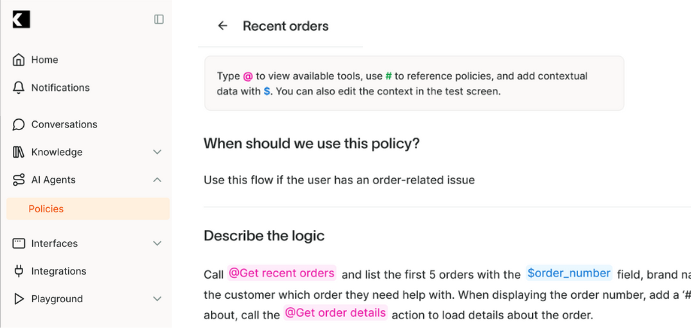Ingredients
Recharge, Gladly, and Kodif.
What are AI Policies?

At Kodif, we’re excited to announce the launch of Policies—a powerful, dynamic solution designed to revolutionize the way CX managers handle customer support. Unlike traditional flows, which are rigid and complex, Policies empower non-technical users to create and manage customer interactions with ease. Written in natural language, Policies make it simple to define and refine customer experiences without needing to rely on complicated flowcharts or scripting. This approach is not only user-friendly but also self-serve, enabling CX teams to quickly translate existing Standard Operating Procedures (SOPs) into automation, saving valuable time and resources.
The flexibility of Kodif Policies ensures that businesses can offer personalized, context-driven support while continuously improving customer experiences. With Policies, you can experiment with different strategies to optimize outcomes such as CSAT, revenue, and retention—all without the need to rebuild complex workflows. Whether it’s automating routine interactions or testing new approaches for high-stakes scenarios, Policies provide a scalable, adaptable solution that aligns with your business goals. While flows still have their place in sensitive, high-risk situations, Policies offer an agile alternative that helps businesses innovate faster and deliver exceptional, tailored experiences at scale.
“Update shipping address” ticket type explained
In customer support, an “Update shipping address” request is a common interaction where a customer seeks to change the delivery address for their order. This can occur due to a variety of reasons such as a recent move, a mistake in the provided address, or a change in delivery preferences. Efficiently managing these requests is crucial for customer satisfaction as it ensures that orders are delivered to the correct location, reducing potential delays or loss of goods. Automating this process not only enhances the customer experience by providing quick resolutions but also alleviates the workload on support teams.
Which Platforms does this AI policy work on?
This policy is designed to work seamlessly across Recharge, Gladly, and Kodif. Additionally, Kodif integrates with all other major platforms, ensuring a wide-ranging applicability and ease of use for businesses operating on various systems.
When should I use this policy?
Use this policy when a customer requests to update their shipping address associated with an ongoing subscription or order. This automation ensures timely updates and reduces the chances of delivery errors.
Describe the logic
Type @ to view available tools, use # to reference policies, and add contextual data with $. You can also edit the context in the test screen.
- Ask for the user’s current shipping address
a. Use @get_recharge_account_details to check if the provided address exists in Recharge.
- Ask for the New Shipping Address
a. Ask the customer to provide the new shipping address they want to use.
- Verify Address Validity
a. Use @check_address_validity to ensure the new address is deliverable.
b. If it is not valid, use macro “The shipping address you provided is not valid. Please provide a different address or contact support for further assistance.”
- Update the Shipping Address in Recharge
a. Use @update_shipping_address(current_address: str, new_address: str) to update the customer’s shipping address in Recharge.
b. Inform the customer that their shipping address has been successfully updated.
Policy logic
Use this policy when a customer requests to update the email address associated with their account.
Describe the logic
Type @ to view available tools, use # to reference policies, and add contextual data with $. You can also edit the context in the test screen.
- Ask for the user’s current email address
a. Use @get_gladly_account_details to check if the provided email exists in Gladly.
- Ask for the New Email Address
a. Ask the customer to provide the new email address they want to use.
- Check for Duplicate Accounts
a. Use @check_email_exists to verify if the new email address is already associated with another account.
b. If it is, use macro “The email address you provided is already linked to another account. Please provide a different email address or contact support for further assistance.”
- Update the Email Address in Gladly
a. Use @update_customer_email(current_email: str, new_email: str) to update the customer’s email in Gladly.
b. Inform the customer that their email has been successfully updated.
Example policy
Use this policy when a customer requests to update the email address associated with their account.
Describe the logic
Type @ to view available tools, use # to reference policies, and add contextual data with $. You can also edit the context in the test screen.
- Ask for the user’s current email address
a. Use @get_gladly_account_details to check if the provided email exists in Gladly.
- Ask for the New Email Address
a. Ask the customer to provide the new email address they want to use.
- Check for Duplicate Accounts
a. Use @check_email_exists to verify if the new email address is already associated with another account.
b. If it is, use macro “The email address you provided is already linked to another account. Please provide a different email address or contact support for further assistance.”
- Update the Email Address in Gladly
a. Use @update_customer_email(current_email: str, new_email: str) to update the customer’s email in Gladly.
b. Inform the customer that their email has been successfully updated.


